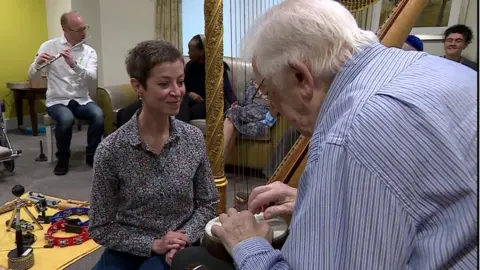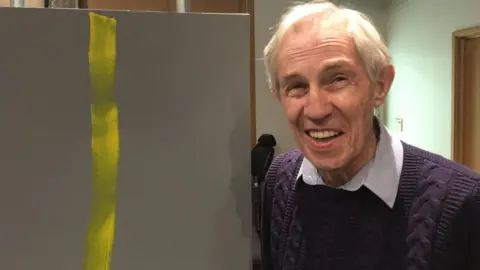Exploring dementia through art and science
 BBC
BBCIt is like watching an awakening. Baton in hand, an elderly resident of a care home in north London is "conducting" a trio of professional musicians, a broad smile on his face.
Like the other residents in the room, he has advanced dementia.
Next to me, one of the carers has a tear on her cheek - she explains that in all her time of looking after these men and women, she has never seen them so engaged and responsive.
There is no doubt about the potential for music to unlock memories, give enjoyment and reveal something of the individual that has been lost through the damage caused to the brain by dementia.
Music for Life is an interactive outreach programme for people with dementia, by Wigmore Hall in London.
Oboist and project leader Julian West told me: "Sometimes we are looking at very small, subtle things, facial expression or how body posture changes.
"People are able to express themselves and show who they are in the moment, revealing snatches of personality."
The session I attended was at Jewish Care's Kun Mor and George Kiss home in north London.
Dementia care practitioner Gill Yentis told me the sessions had benefits for carers and those with dementia.
She said: "Sometimes a resident may arrive in an agitated state, but by the end they leave with a tangible sense of wellbeing, which their families often notice.
Created Out of Mind
"For the staff, it helps them to learn to see the residents in a different way.
"Despite advanced dementia, they are able to see more of the person they used to be."
Music for Life is one of many projects linked to Created Out of Mind a team of scientists, artists, musicians and writers based at the Wellcome Collection.
Launched in 2016, it is exploring the impact of dementia on the creative mind and challenging the stigma surrounding the condition.
I am one of the collaborators, and see my role as helping to improve public understanding of dementia - the most feared condition among adults in the UK.
Forty years ago, the same fear and taboos surrounded cancer, but better treatments and public awareness changed that.
There is still no medicine that can slow the progress of Alzheimer's disease - the most common form of dementia.
No 'silver bullet'
Dozens of drug trials have failed, although there are some promising compounds being tested.
More money is coming in to dementia research, but it still lags way behind the spend on cancer.
It's also clear that there will not be a single "silver bullet" medicine to halt dementia - we are going to need a generation of drug breakthroughs to address its many forms.
While we wait, society must do more to address the taboos surrounding dementia, which are partly due to ignorance.
Created Out of Mind director Prof Sebastian Crutch, at the University College London Dementia Research Centre, told me: "We are trying to enrich understanding of the dementias: not just the fact that there are over 100 types, but that people's experiences will vary from person to person."
Too often, a diagnosis of dementia can be a label that sees individuals effectively sidelined from society.
Created Out of Mind has focused on the experiences of those living with dementia and how the arts can help communicate personal stories.
The project, based in The Hub, on the fifth floor of the Wellcome Collection, has been a venue for music, poetry and visual art, created or inspired by people with dementia.
 Fergus Walsh/BBC
Fergus Walsh/BBCOne thing that struck me is the enthusiasm that many affected individuals and their carers had for taking part in research.
Edward Osmotherly, 76, has a rare dementia called posterior cortical atrophy (PCA), which affects his spatial awareness and causes difficulty with numbers.
By contrast, his memory is still largely intact and he deals with his condition with good humour and charm.
I met him at a UCL lab where researchers are investigating the balance problems caused by PCA.
The project was inspired by a PCA patient who asked: "Am I the right way up?"
Paintbrush in hand, Mr Osmotherly was asked to paint lines of yellow paint on a canvas - with motion sensors attached to his body.
It's part artistic, part scientific experiment.
Mr Osmotherly told me he had enjoyed the experience - "much more fun than a drug trial" - and had this plea to the public: "Please talk to people with dementia as if they were human beings, don't be frightened of them."
Charlie Harrison, one of the resident artists at Created Out of Mind, said: "There is no right or wrong when creating art work, so for a lot of people with dementia it remains a strength and a medium by which they can express themselves."
Dementia is a cruel condition, which can rob the individual of their sense of identity, their memory, their ability to communicate with others and cause dramatic shifts in personality.
Created Out of Mind has challenged the stereotype of dementia, and presented something more nuanced and, in many cases, more hopeful.
There is understandably a focus on what is lost with dementia, but what is retained of the creative mind by those living with the condition is to be cherished.
Follow Fergus on Twitter.
